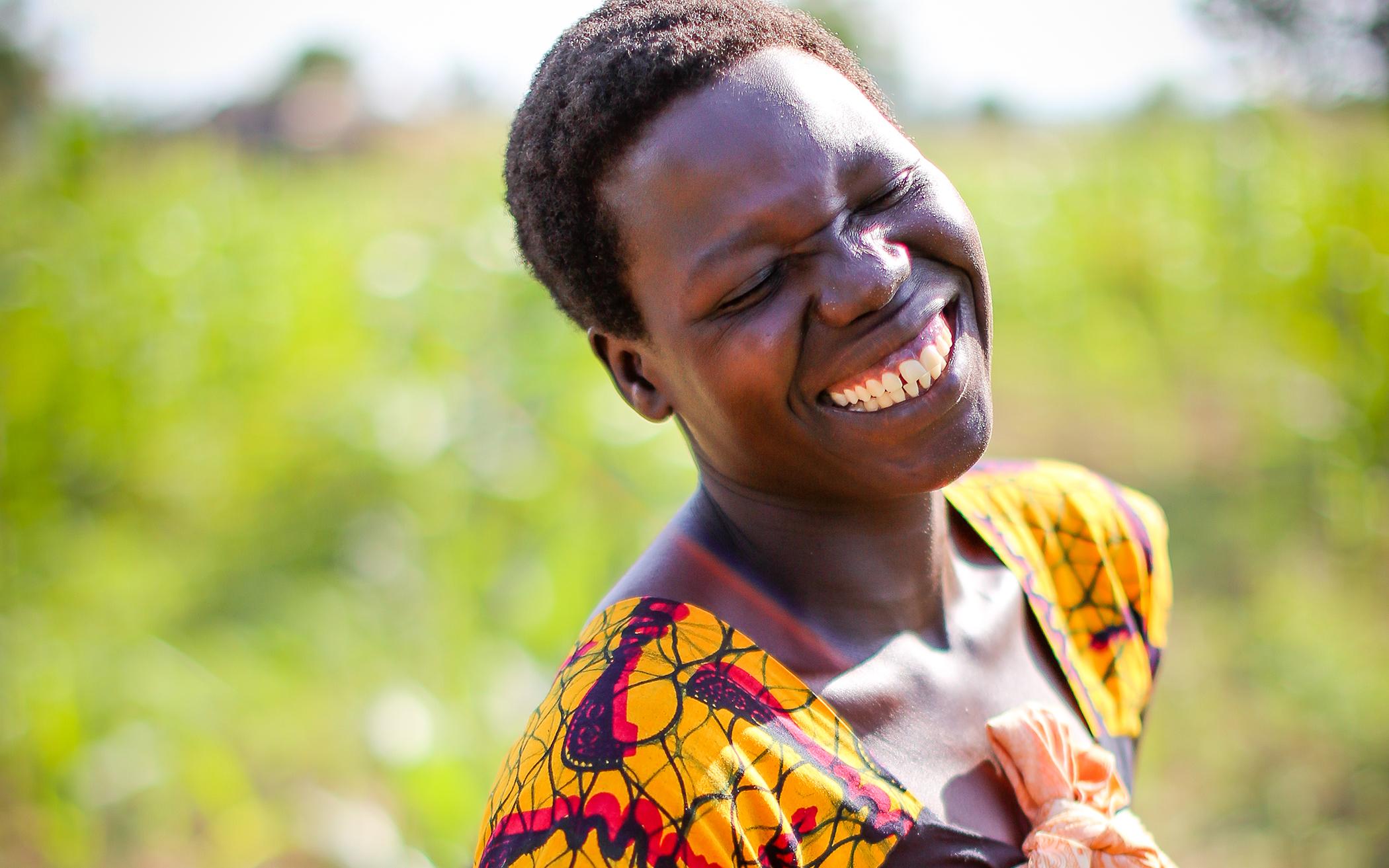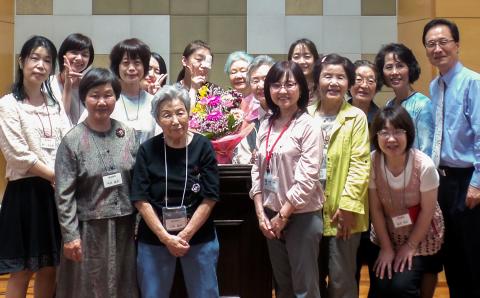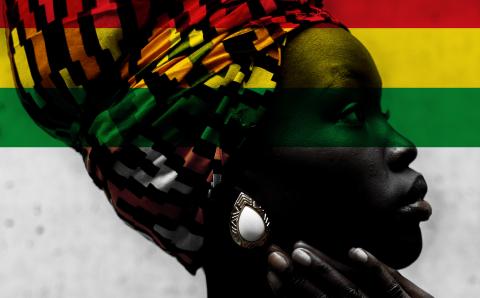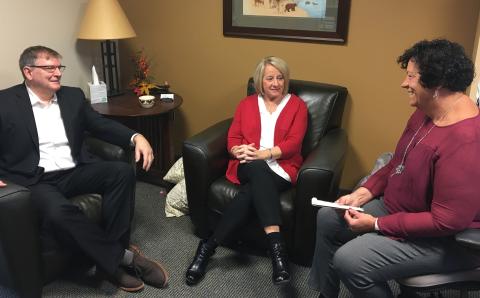For many, the word “calling” prods thoughts of personality and strength: What am I good at? What do I enjoy? What spiritual gifts has God given to me?
Rarely do we think of our calling as a single defining moment. Yet sometimes that is how it happens. Ida Kaastra Mutoigo was 13 years old, sitting on a porch swing, when she heard God call her in the wind. Carol Bremer-Bennet, at the time a recent graduate from Calvin College, was driving a gray Toyota Corolla when God called her to the sands of New Mexico.
For Kaastra Mutoigo, God’s call came not as an audible voice, but as a deep, profound peace.
“I told my parents that night at the supper table, ‘I think God wants me to be a missionary.’ It was a life-defining moment for me, and my parents were utterly unfazed,” she said. “I think they discounted it as a fleeting, childish thought…. But I felt in my heart a strong certainty—‘You will see.’”
For Bremer-Bennett, God’s call came amid fear and loss. “A number of things happened at that point in my life that made me want to run away. That’s what I thought I was doing: climbing into that car and running away from God,” she said. “Like Jonah, I thought I was in control, but really, God let that little car swallow me up like a whale and carry me right to where I needed to be.”
“New Mexico was the place where my life as a Navajo-born woman who was raised in a Dutch family all fell into place. It was out in the sands of New Mexico that I came to believe I was made uniquely and placed precisely where God intended. There, I discovered my core identity: beloved daughter of God.”
Today, Kaastra Mutoigo and Bremer-Bennett serve as co-directors for World Renew, the global development arm of the Christian Reformed Church. Both directors agree that sharing the hope of Jesus in more than 30 countries while changing the story of poverty requires creative collaboration.
In Bremer-Bennett’s estimation, this shared leadership is biblical. “God never calls us to his work alone. Within God’s own self we see the relationality of the Trinity. In his time on earth, Jesus models relational ministry—sending his disciples out in pairs and groups. And quite frankly, the work of World Renew is not possible alone; it requires too much of us. In Ecclesiastes 4, we read of the cord of three strands that is not easily broken. That’s not because one strand is stronger or more fit than another. All are equal; all are needed,” she explained.
Kaastra Mutoigo agreed. “When Carol and I come into contact with other organizations like World Renew, I see a lot of solitary [executives] and leaders,” she said. “I cannot imagine what that is like. The greatest benefit of shared leadership is the way we can bring complementary gifts to the table. That means multiple perspectives can be utilized in all decision-making, particularly for complex situations.”
When it comes to the work of ending global poverty, nothing is simple. Kaastra Mutoigo is grateful to be able to walk into those spaces with another leader. “It keeps you both humble and encouraged in the work,” she said.
In reflecting on her calling as a whole, Bremer-Benett said she finds gratitude to be her guide in discerning God’s will. “The path I have taken is mostly about faithfulness to step forward and say ‘thank you.’ Every action I take is a response of joy to places where God has loved me. That means my work keeps leading me to step toward those who are marginalized and oppressed.”
Bremer-Benett carries stories of colonization and dispossession deep within her being. Barbed and heavy narratives press upon her heart. Perhaps it is the burden of her people’s history that attunes her to the voices of those who are often silenced. Perhaps it is her own story as a bridge-builder between Western and Indigenous cultures that stokes her fire for revitalized communities.
Either way, from the acres of Rehoboth School in New Mexico to World Renew’s multinational efforts in North and Latin America as well as Asia and Africa, Bremer-Bennet lives out her call to gratitude by supporting and bearing witness to God’s faithful provision of flourishing for all people.
Indeed, human flourishing plays a central role in all of World Renew’s work, and it represents a key value for Kaastra Mutoigo as well, particularly in the context of gender.
Kaastra Mutoigo has worked for World Renew since she graduated with agriculture degrees from Dordt University and University of Guelph. Starting in the Grand Rapids office, she soon had an assignment to Uganda and took it with joy. Through her years at World Renew and in various countries, Kaastra Mutoigo’s understanding of the transformation that men and women find in partnership has only grown. “Looking at gender around the world, there are different perspectives and values that together lead to flourishing,” she explained.
Yet in examining different patriarchal and matriarchal cultures, Kaastra Mutoigo noticed a lack of balance and a broken flow of power that hinders flourishing in those contexts. “If you look at poverty and injustice, she explained, “the cause of those challenges is usually a misuse of power or a poor distribution of power. When someone wields their power over another human being or set of human beings, it leads to poor distribution of resources and poor decision-making.”
“Every culture has a certain set of expectations for the use of power by men and women,” she continued. “Sometimes a culture’s expectations fail to reflect the truth of the gospel. This is particularly true in cultures of hierarchy and animism. But as soon as men and women come to the table together with reciprocated respect, worth, and value … as soon as they recognize we all reflect the image of God, that’s when you have the best chance of overcoming unfair power distributions that perpetuate injustice and poverty.”
This work might be slow-moving, Bremer-Bennett said, but it is also transformative. “North Americans often assume they have the best way to point to Jesus. Asset-based community development shows a different path. It means being invited into a global community to assess what is already there that can be used to further those people’s journey and better enrich their lives. It means empowering people to help themselves thrive and meeting Jesus in the work already happening in that place.”
But what does such work look like on the ground?
In Uganda, there’s a mother named Grace. For many years, Grace lived a life not so different from other women in her culture, shouldering primary responsibility for fetching water, household chores, tilling crops, and feeding and caring for her family while her husband worked in the garden and then headed to town to gamble and drink with other men.
In many ways Grace’s life felt like a prison keeping her and her entire family trapped in a cycle where money disappeared too quickly, crops never yielded bounty, and needs were never met fully.
Then, in 2012, World Renew started working in Grace’s village. That work included sustainable farming techniques to yield better crops and a Village Savings Group to build up financial stability. It also included trainings for husbands and wives. Not only did this work encourage members of the village to start talking about how they spend their time each day and how they could shoulder their work as a team, it also examined the issue of gender through a biblical lens.
For the first time, Grace and her husband started imagining a different way of relating, working together, and leading their family. Change didn’t happen immediately. In fact, Grace’s husband felt a lot of pressure; he did not want the other men in the community to look at him differently. Yet God was faithful. Over time, family after family in Grace’s village began practicing a shared approach to labor and saving. Soon, Grace and her husband joined.
Today, Grace and her husband share the work equally for their land and home. Their crops are thriving, their children are in school, and their lives have been transformed.
Grace felt the call of World Renew, the same call carried by Kaastra Mutoigo and Bremer-Bennet—not grandiose, but measurable, enduring, and shared. It’s a call for women and men, Indigenous peoples and refugees, North Americans and entire communities around the world.
It’s a call to abundant life.
“Anything that gives life is God’s intention,” said Kaastra Mutoigo. “If you are trying to figure out where God is in a space, look for the life that is trying to grow, and do what you can to help it.”
About the Author
Katy Johnson, World Renew








